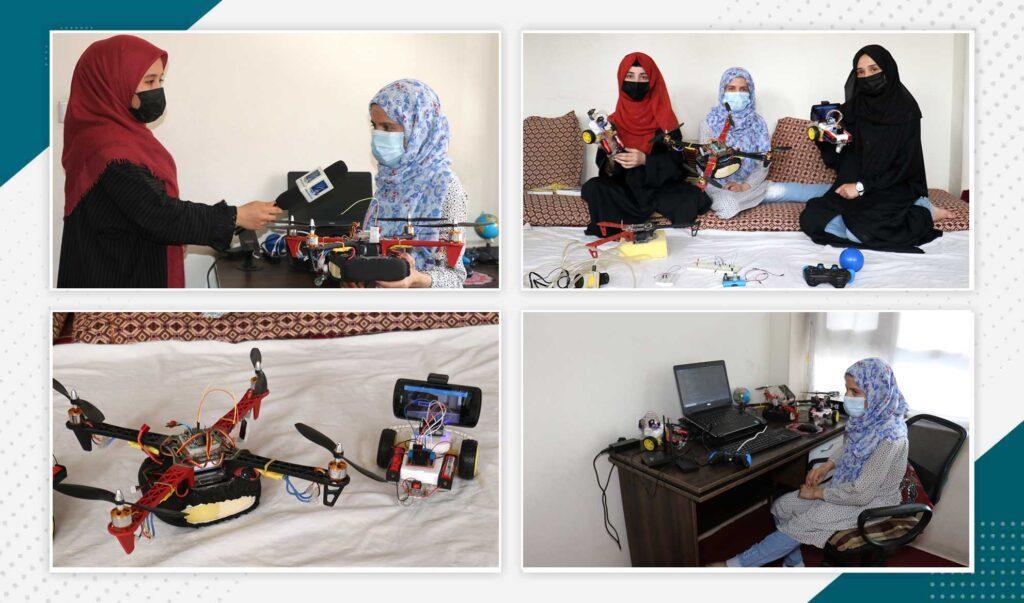
Unshaken By Polio, Kabul Girl On Path Of Innovation
KABUL (Pajhwok): Asrar Parsa, a young girl in Kabul who contracted polio at the age of two and was left with a paralyzed left leg, is now actively working on several artificial intelligence-based projects with a sharp mind and unwavering determination.
She dreams of participating in global competitions in the field of innovation and technology.
Leading a six-member team, Asrar is currently working on multiple AI-based projects.
She appeals to the government and the international community to support her team so they can take part in international competitions.
Asrar Parsa: A girl who stood up to shape her future
Living in a small but bright home nestled in the bustling alleyways of Sarai Shamali, Kabul, Asrar Parsa , with trembling hands but a strong mind, is redesigning her future through science and technology.
She was not yet two years old when polio struck and paralyzed her left leg. However, Asrar never gave up. Encouraged by her family, she seized every opportunity to learn and grow.
Despite facing many challenges, she excelled academically from first to twelfth grade, consistently ranking among the top students. In 2013 (1392 Solar Year), she graduated from Bibi Sarwari Sangari High School.
Due to her strong interest in learning, especially English and computer, Asrar aspired to pursue higher education in computer science.
In 2021 (1400 Solar Year), she successfully enrolled at the private higher education institute“Idrak” to study her desired field.
However, her dream remains incomplete. After the Islamic Emirate of Afghanistan (IEA) came to power, education for girls in higher institutions was suspended until further notice.
Asrar says that the restrictions on girls' education negatively impacted her mental well-being. Still, she refused to remain idle and chose to move forward in her selected path. She is now taking various programming courses online.
In addition to her online studies, she works on AI-based projects alongside her brother, who is a computer science graduate.
She said:“My motivation sparked when I watched a documentary that showcased various uses of artificial intelligence - from prosthetic limbs to self-driving cars.”
She continued:“In one part, it showed a mountain climber whose leg was injured in an accident and couldn't continue his passion. But a friend built him a prosthetic leg controlled by the brain, allowing him to climb again. The artificial limb was so advanced that it felt like a real leg.”
That documentary inspired her to research more about AI, its applications, and how it works - and to commit to the path.
With the help of her brother, Asrar's first project was a gas sensor. She now leads a six-member team that includes her brother and four of her former university classmates - all working on research and practical AI projects.
She mentioned one of their projects involves building a device that can track a ball based on color recognition.
“Unfortunately, it's very difficult to find the necessary equipment in Afghanistan. I usually have to purchase the required tools from Iran with my own money,” she said.“Another project involves designing an AI-based robot capable of recognizing 20 pre-defined objects. All these projects have been developed over the past one and a half to two years.”
Asrar has a message for Afghan girls:“Never lose hope or think your future is dark. Use available opportunities like online courses and universities to continue your education and personal growth.”
Polio had such a deep psychological impact on her that while recalling those painful memories, she broke down in tears and said:“Back then, the polio vaccine wasn't widely available. I got paralyzed. Later, I was taken to the Red Cross where I underwent surgery and had braces fitted. Now, I live with this leg and move forward with my life.”
She appeals to national and international organizations to support her team so they can grow and compete globally.
Brother's support that paved the path of knowledge
Naveed Parsa, Asrar's older brother and a computer science graduate, stood by her side when girls were banned from education.
“My sister was deeply upset. I told her not to worry, that we would find a solution. We spent days thinking and working until we finally decided to form a team,” he said.
After the team was formed, Naveed provided her with the necessary tools and equipment.
“I had some robotics equipment and handed them over. We began programming lessons. Asrar is passionate about science and technology and has great mathematical skills - traits that helped her progress.”
Naveed said his sister dreams of using AI to design and build artificial limbs for people with disabilities.
Friendship that turned into a journey of growth
Ayesha Siddiqi, Asrar's university classmate at Idrak, and a member of the six-person team, said:“Asrar and I were classmates. After the universities closed for girls, I contacted her and asked what she had been doing. She was involved in programming - which inspired me to join her.”
She added:“Unfortunately, our country is behind in technology. Our goal is to contribute, even in small ways, to its advancement. We want to give hope to Afghan girls and prove that they are capable of achieving their dreams.”
Education expert: Asrar is an inspiration to other girls
Abdullah Alizada, a professor at a private higher education institution in Kabul, told Pajhwok:“Education is a universal right. Women make up half of society and play an impactful role both in families and communities.”
He believes that the more women are educated, the more the society progresses.
“An educated girl has a different outlook on life compared to one without education. She plays a constructive role in the growth of her family and society.”
According to Alizada, individuals deprived of education often have limited impact and mostly remain observers rather than change-makers.
“Girls who turn to online learning despite the restrictions are showing that they still seek to be contributors,” he said.“The COVID experience also showed us that education is not limited to physical classrooms.”
He concluded by praising Asrar, saying:“When a girl - especially one with a disability - chooses to learn, it not only builds her confidence but also inspires others. She proves it's possible to be independent and stand on your own feet.”
Alizada called for equal educational opportunities for all girls.
sa/ma

Legal Disclaimer:
MENAFN provides the
information “as is” without warranty of any kind. We do not accept
any responsibility or liability for the accuracy, content, images,
videos, licenses, completeness, legality, or reliability of the information
contained in this article. If you have any complaints or copyright
issues related to this article, kindly contact the provider above.
















Comments
No comment